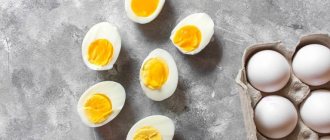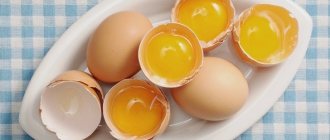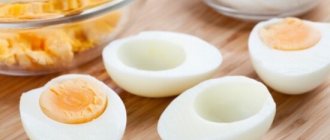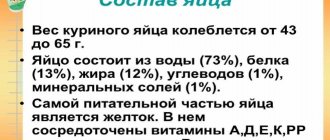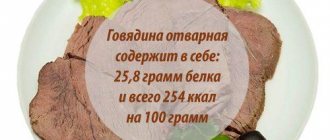Dec-27-2019 Author: KoshkaS
How many calories are in the white of a chicken egg, what dietary properties it has, all this is very interesting for those who are trying to lead a healthy lifestyle, monitor their health and figure. So we will try to answer these questions in the next article.
So here it is:
Chicken eggs occupy a prominent place in the menu of modern man. They are one of the healthiest foods. All the nutrients in eggs are balanced and well absorbed by the body.
A chicken egg contains 12.7% complete animal protein, containing essential amino acids, and 11.5% fat. They contain various vitamins: A, B1, B6, D and E. The yolk is richest in vitamins. The egg contains many useful minerals, including phosphorus, iron, calcium, potassium, as well as trace elements (iodine, copper, cobalt).
How to boil an egg correctly:
- Never boil eggs straight from the refrigerator because cold eggs are likely to burst if immersed in hot water.
- Use a kitchen timer. Trying to guess the time, or remember to look at the clock, you will not achieve the desired degree of “cookiness”.
- The pan should preferably be small, because if you boil several eggs in a large pan, they may break against each other.
- At the blunt end of the eggs, inside, there is a pad where air collects. Usually, during boiling, the pressure there increases, and as a result, the egg may crack. To avoid this, pierce the egg with a needle and let the steam escape.
- Never put eggs on high “fast” heat, cook on medium. If you don't use a timer, don't cook the eggs for too long - the yolks may turn black and literally become rubbery.
- If the eggs are very fresh (less than four days old), they will take a little longer - about 30 seconds.
And about calories:
FAQ
What's the best way to cook egg whites? Cook. This method of heat treatment preserves its nutritional value and beneficial properties. To destroy the dangerous salmonella bacillus, 10-12 minutes of cooking is enough. Frying protein is not recommended because it disrupts the structure of the product (the denaturation process starts), resulting in a decrease in the energy value of the product. In addition, this method of heat treatment leads to the entry of oil into the body, which carries carcinogens that are dangerous to the digestive system and liver.
Interestingly, egg white begins to “set” at a temperature of +60 degrees, and hardens at +65 degrees. At the same time, the yolk acquires a dense consistency at +65 degrees, and at +73 degrees it becomes completely hard.
What does egg white consist of? From fats (0.3%), carbohydrates (0.7%), proteins (13%), water (85%), vitamins, enzymes. It contains all the important amino acids for the construction of protein in the human body. In addition, it contains lysozyme, a compound that neutralizes harmful microorganisms, including putrefactive ones.
BZHU, calorie content of eggs
An average-sized egg weighs approximately 55-60 g and contains about 70 kilocalories. The white accounts for 60% of the total mass of the egg, the yolk accounts for 30%, and the shell accounts for 10%. BJU of raw chicken eggs is as follows:
- Proteins - 12 grams.
- Fat - 11 grams.
- Carbohydrates - 1 gram.
The calorie content and nutritional value of a chicken egg may vary depending on how it is prepared. There are many methods for cooking eggs, and each of them has its own effect on the ratio of elements. For example, BJU eggs and their calorie content are not very different from the same indicators in their raw form, but as soon as you break it into a frying pan with oil, the situation changes dramatically.
You can add nuts in different forms to your recipes, such as grated, toasted, crushed or even, you can eat them raw. This dry fruit is ideal when you combine them with salads, wraps, soups, stews and baked goods. But pay special attention to the size of the diet.
They're a great source of many nutrients, but they're also a good dose of calories thanks to the healthy fats they contain. One serving contains 28 grams. If you have a lot of nuts at home, it is recommended to store them in the refrigerator. The cold will help preserve your fats so they don't go stale.
The calorie content of an egg can also be affected by what the chicken eats. If the bird had the opportunity, in addition to eating special feed, to walk over a large area and find various grains or larvae, then the egg will have a higher calorie content compared to what was obtained at a poultry farm. Eggs from domestic chickens are more valuable not only for their nutritional content, but also for their benefits to the body.
Peas, dried beans and lentils belong to the food group known as "legumes". Other than soybeans, these plants have very similar nutrient contents, including a good dose of protein. On average, they contain about 15 grams of protein per cup, and along with the major proteins, fiber and iron. Adding dried beans, lentils and peas to your meals is a good way to replace meat and still get a much-needed dose of protein. Add vegetables to soups, salads, wraps, casseroles, pasta dishes and more.
You can make hummus by crushing chickpeas to add to your sandwiches or dips for your vegetables or snacks. Soy is a complete protein and is comparable in quality to animal proteins. Soybeans and soy products have been a growing trend in the United States for the past five decades, but this rich source of protein has been a staple in Asia for nearly a thousand years. This powerful plant is used to create a variety of high-protein soy-based products: tofu, tempeh, textured vegetable protein, soy milk, and “meat analogues” such as “chicken” or vegetarian “ribs”, which are becoming an increasingly popular imitation among population, as vegetarianism is also growing.
There is a myth that you should only eat white eggs, because if a brown or brown egg is a chicken egg, its nutritional value and calorie content are significantly different. In fact, the color of an egg does not in any way affect the indicators of the substances in it.
Eggs are one of the most unique foods on the planet, because they are 98% digestible by the human body. And even if there are cases of allergies, this does not change its nutritional value. Chicken eggs do not harm the body and are completely excreted, while at the same time saturating it with useful elements.
In a culture that focuses primarily on wheat, it is easy to overlook the many different grains available. Some of these grains are very rich in protein and can be included in your diet to get a good intake of carbohydrates and protein to develop muscles. You can also cook and mix with honey, berries and almonds. This is a good breakfast full of protein to start your morning off well. Other protein-rich grains include pellets, oats, amaranth and buckwheat.
You can choose other types of grains such as pasta, bread and rice for a more nutritious meal. If you consume dairy in your diet, this is a great way to add a few extra grams of protein into your daily routine. Low-fat milk, cheese and yogurt are easy-to-find foods that are quick to prepare and fun to incorporate into many meals and snacks. If you eat a glass of skim milk or snack on some cheese, you can increase your protein intake by 8 grams.
Useful microelements in chicken eggs
Chicken eggs are not only a high-quality product, but also a source of a large number of useful bioregulators, minerals and proteins. What exactly does a chicken egg contain and how does eating it affect human health?
- Niacin, or vitamin B3, is essential for cell nutrition and promotes the production of sex hormones.
- Choline, or vitamin B4, improves memory and activates the process of cleansing the liver of poisons.
- Vitamin D is important for maintaining phosphorus and calcium levels in the body. Eggs rank second on the list of foods rich in vitamin D, second only to fish oil.
- Vitamin K is necessary for normal blood clotting.
- Vitamin E and iron - actively fight bad mood and fatigue, are necessary to prevent cardiovascular diseases.
- Vitamin A - improves immunity, has a positive effect on growth and vision.
- Vitamin E - counteracts the development of certain forms of cancer and makes eggs a kind of “elixir of youth”, because this vitamin preserves natural beauty and prevents the body from aging.
- Vitamin B12 has a beneficial effect on hematopoiesis and is a way to prevent nervous diseases. One egg satisfies the daily requirement for vitamin B12 by 100%.
And this is only a small part, because chicken eggs are rich in calcium, manganese, selenium, folacin, sodium, zinc, biotin and folic acid, it contains almost all vitamins (except vitamin C), essential amino acids.
BZHU yolk
Chicken yolk consists of 50% water, 32% fat, 16% protein, and 2% minerals. The yolk of a medium-sized chicken egg contains about 50-55 kilocalories; per 100 grams - 350 kilocalories.
BZHU chicken eggs without protein:
- Proteins - 16 g.
- Fats - 31 g.
- Carbohydrates - 1 g.
The great value of the yolk is that it contains a whole complex of fatty acids that have a positive effect on the functioning of the entire body. But many people eat eggs according to the principle “white in the plate, yolk in the trash” due to the fact that the yolk contains a lot of cholesterol. Yes, the yolk is really rich in cholesterol, but it is also necessary for the human body. For example, if the body has low cholesterol levels, the liver begins to produce it itself. Eating egg yolk in moderation will not harm your health. In addition, in addition to cholesterol, the yolk of a chicken egg contains many useful substances, such as lecithin, which promotes brain activity and prevents the development of sclerosis, or which activates metabolism.
Chicken egg (white)
The chicken egg is one of the most affordable, tasty and nutritious food products known to man since time immemorial. Inside the dense shell there is a transparent, multi-layered protein mass, which has different densities to hold the core - the yolk - in the center. Protein is an almost colorless viscous liquid, odorless, has a gluing property, and forms a dense foam when whipped.
Egg white calories
The calorie content of egg white is 44 kcal per 100 grams of product.
Composition and beneficial properties of egg white
90% of egg white is water, the rest is proteins of various types, such as ovoalbumin, ovomucin, lysozyme, etc. Egg white also contains: choline, vitamins A, B1, B2, B6, D, E, essential minerals: calcium, zinc, manganese, iron (calorizator). Protein does not contain fat or cholesterol, so it is an ideal food for those recovering from viral, colds and other diseases. The protein of fresh chicken eggs has bactericidal properties, is necessary for hematopoietic processes, improves the functioning of brain cells, and is a preventative against the formation of cataracts. Egg white is a powerful immunostimulant and has the ability to neutralize the negative influence of the external environment.
In terms of nutritional value, an egg can replace 200 grams of milk and 50 grams of meat. Chicken eggs have the highest digestibility among products of animal origin, which is 97-98%, that is, the egg is almost completely absorbed by the body
Egg white harm
Excessive consumption of eggs provokes an increase in the level of “bad” cholesterol, which is fraught with the risk of cardiovascular diseases. And protein can cause allergic reactions if you are individually intolerant to the product.
Egg whites for weight loss
To effectively “dry” the body (reduce body fat with minimal loss of muscle tissue), bodybuilders often use an omelet made from egg whites alone. Various diets include both whole eggs and separate whites. Examples include the high protein diet, the Brazilian diet, and the white diet for weight loss.
Egg white in cooking
The most common dish made from egg whites is the airy meringue dessert (or meringue
, it’s more common). Meringue is prepared as a separate delicacy, or coated with protein mixture on pies and cakes, then baked to a delicious crust. Protein cream - the name speaks for itself; it is used to fill tubes, eclairs and baskets, and is used as a layer for sponge cakes. Almost no dough can do without egg whites, be it bread, pastries, pancakes or dumplings with dumplings. Fresh egg whites are added to minced meat for cutlets or rolls to prevent the finished products from falling apart. Boiled egg whites (either as part of a whole egg or on their own) are ingredients in many appetizers, salads and soups.
Other uses of egg white
Chicken egg white is successfully used for medical purposes - with its help you can significantly relieve pain from burns and stop severe nosebleeds. Taking fresh egg whites internally will relieve pain and sore throat, restore a lost voice and is indicated for poisoning, especially with mercury vapor.
In cosmetology, egg white is used to prepare masks to improve the condition of hair; it is included in many products that smooth out wrinkles and maintain skin tone. An excellent mask for oily skin - rolled oatmeal flakes and egg white, the mask removes oily shine and gives the skin a matte appearance.
For more information about chicken eggs, their sizes, weight, categories, see the article Chicken Egg.
You can learn more about the benefits and harms of eggs from the video clip of the TV show “About the Most Important Thing.”
Source
Nutritional value and chemical composition of “Raw egg white”.
| Nutrient | Quantity | Norm** | % of the norm in 100 g | % of the norm in 100 kcal | 100% normal |
| Calorie content | 48 kcal | 1684 kcal | 2.9% | 6% | 3508 g |
| Squirrels | 1.1 g | 76 g | 1.4% | 2.9% | 6909 g |
| Carbohydrates | 1 g | 219 g | 0.5% | 1% | 21900 g |
| Water | 87.3 g | 2273 g | 3.8% | 7.9% | 2604 g |
| Vitamins | |||||
| Vitamin B2, riboflavin | 0.61 mg | 1.8 mg | 33.9% | 70.6% | 295 g |
| Vitamin B4, choline | 39 mg | 500 mg | 7.8% | 16.3% | 1282 g |
| Vitamin B5, pantothenic | 0.24 mg | 5 mg | 4.8% | 10% | 2083 g |
| Vitamin B6, pyridoxine | 0.01 mg | 2 mg | 0.5% | 1% | 20000 g |
| Vitamin B9, folates | 0.001 mcg | 400 mcg | 40000000 g | ||
| Vitamin H, biotin | 0.007 mcg | 50 mcg | 714286 g | ||
| Macronutrients | |||||
| Potassium, K | 152 mg | 2500 mg | 6.1% | 12.7% | 1645 g |
| Calcium, Ca | 10 mg | 1000 mg | 1% | 2.1% | 10000 g |
| Magnesium, Mg | 9 mg | 400 mg | 2.3% | 4.8% | 4444 g |
| Sodium, Na | 189 mg | 1300 mg | 14.5% | 30.2% | 688 g |
| Sera, S | 187 mg | 1000 mg | 18.7% | 39% | 535 g |
| Phosphorus, P | 27 mg | 800 mg | 3.4% | 7.1% | 2963 g |
| Chlorine, Cl | 172 mg | 2300 mg | 7.5% | 15.6% | 1337 g |
| Microelements | |||||
| Iron, Fe | 0.15 mg | 18 mg | 0.8% | 1.7% | 12000 g |
| Yod, I | 0.007 mcg | 150 mcg | 2142857 g | ||
| Cobalt, Co | 0.001 mcg | 10 mcg | 1000000 g | ||
| Manganese, Mn | 0.007 mg | 2 mg | 0.4% | 0.8% | 28571 g |
| Copper, Cu | 0.052 mcg | 1000 mcg | 1923077 g | ||
| Molybdenum, Mo | 0.004 mcg | 70 mcg | 1750000 g | ||
| Chromium, Cr | 0.003 µg | 50 mcg | 1666667 g | ||
| Zinc, Zn | 0.231 mg | 12 mg | 1.9% | 4% | 5195 g |
| Digestible carbohydrates | |||||
| Mono- and disaccharides (sugars) | 1 g | max 100 g | |||
| My | |||||
| My nutrient 1 | 1.1 | ||||
| Monounsaturated fatty acids | 7.33 g | min 16.8 g | 43.6% | 90.8% | |
| Polyunsaturated fatty acids | 5.44 g | from 11.2 to 20.6 g | 48.6% | 101.3% |
What are the benefits of egg whites?
Egg white is an important component of human food and has the following positive effects:
- Activates the functioning of the brain thanks to the amino acids in its composition;
- Improves blood clotting, improves hematopoiesis due to the presence of minerals (zinc, iron, potassium, calcium, manganese).
- Removes toxins from the liver;
- The content of lecithin and choline facilitates the removal of fats and “bad” cholesterol from the body, which is important for people watching their weight.
- Strengthens the cardiovascular system. Eggs contain “good” cholesterol, which protects blood vessels from microdamage and plaque accumulation.
- Increases the level of “good” cholesterol in the blood;
- Prevents the development of eye cataracts, has an antitumor effect due to vitamins A and E.
- Has antibacterial properties;
- Stimulates the immune system and metabolism thanks to vitamins B, E, K, A, D, choline, niacin.
Protein is 88% water and 10% protein. Fats and cholesterol are contained in small quantities.
The rest is occupied by:
- Carbohydrates (glucose);
- Enzymes;
- Essential amino acids;
- Microelements;
- Vitamins.
All components in the product improve metabolic processes in the body, promote rapid renewal of cells and hormones, tone and protect from external negative influences. Egg protein is absorbed by the body by 97-98%.
The nutritional value
In terms of nutritional value, a chicken egg is equivalent to 200 ml of milk or 50 g of meat.
Eggs are divided into categories based on weight:
| Category | Egg weight (g) | Protein content (g) |
| C 3 | 35-45 | 2,7-3,4 |
| C 2 | 45-55 | 3,4-4,1 |
| C 1 | 55-65 | 4-4,8 |
| From 0 | 65-75 | 4,7-5,6 |
| Higher | From 75 | From 5.6 |
